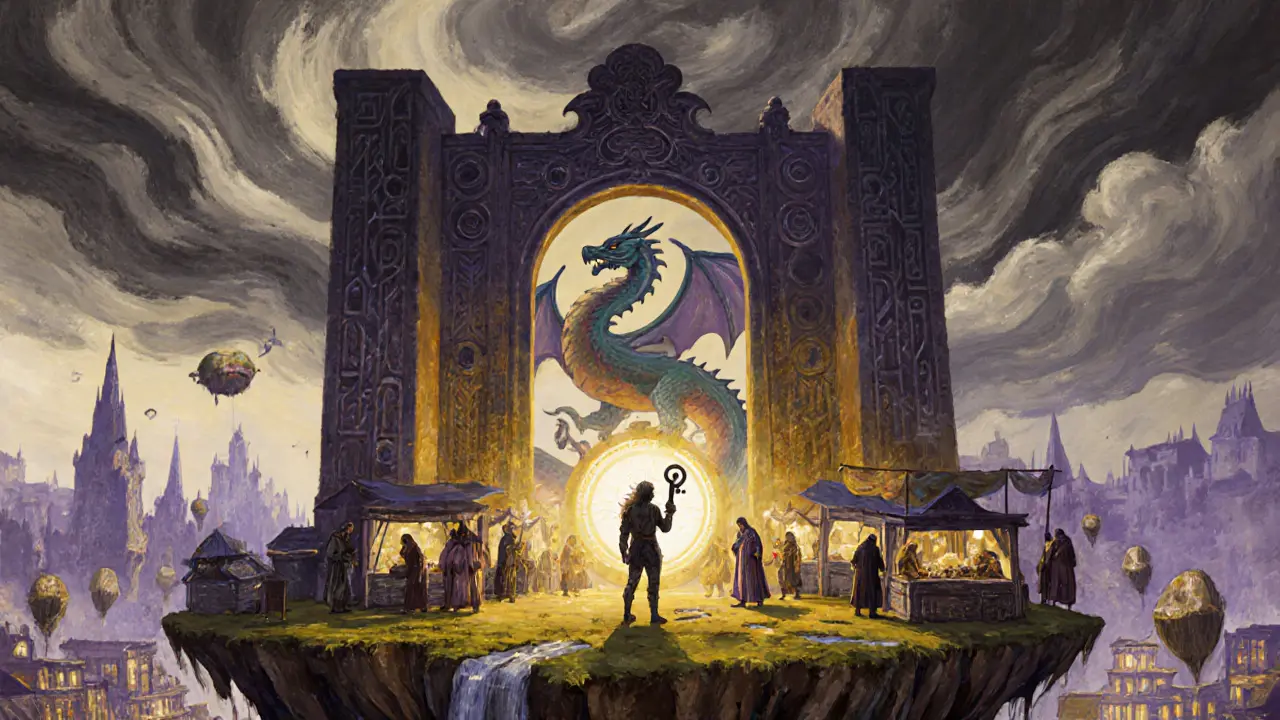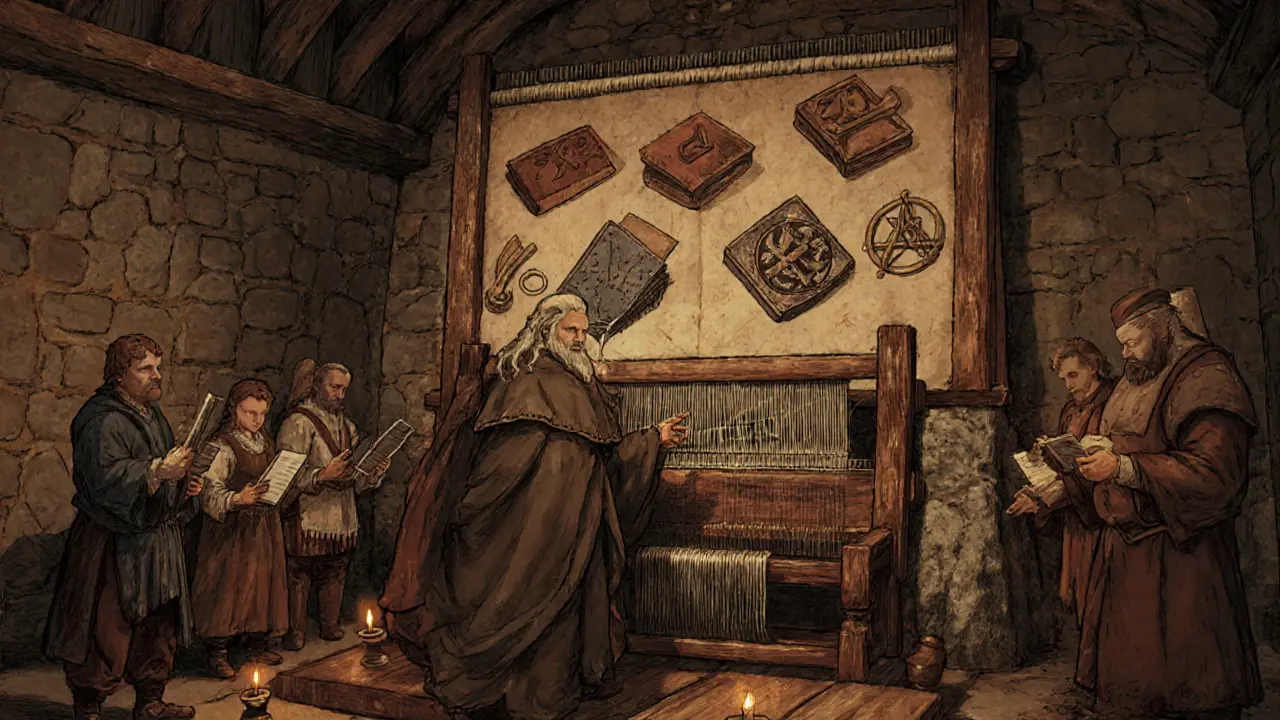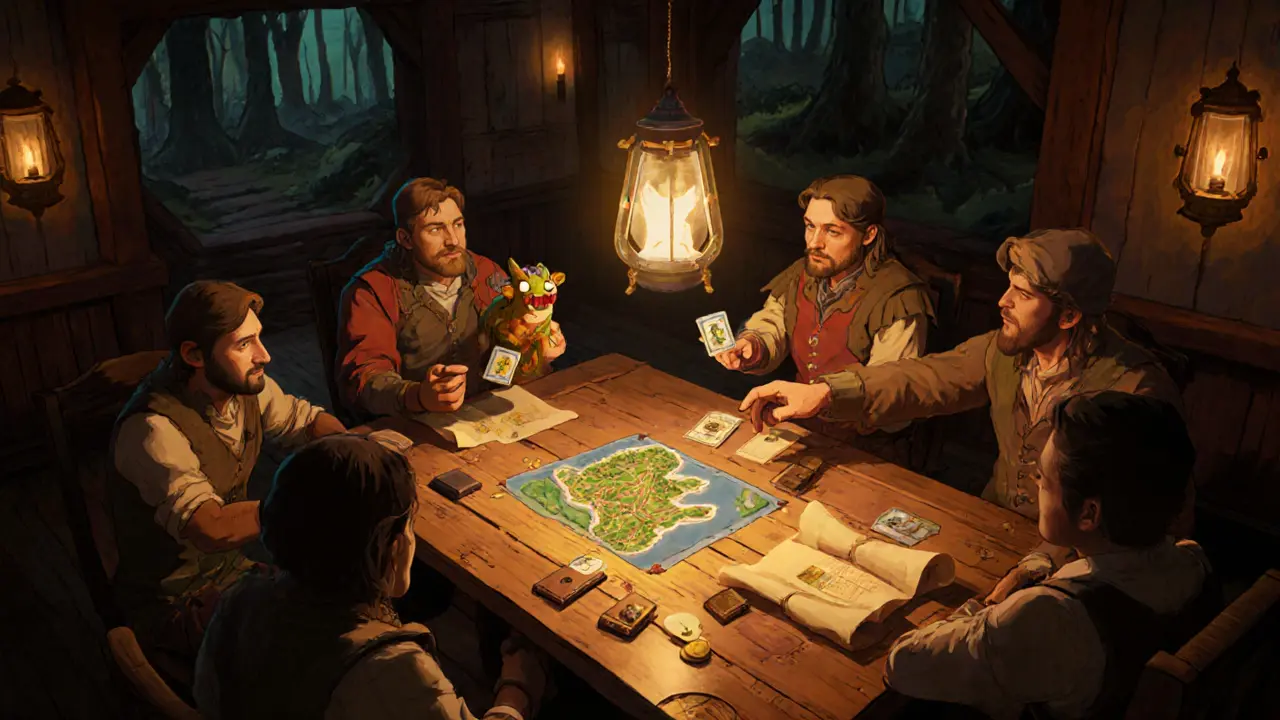Play-to-Earn Earnings Calculator
Estimate Your Earnings
Earnings Breakdown
Estimated Annual Earnings:
$0.00
Estimated Monthly Earnings: $0.00
Estimated Daily Earnings: $0.00
Important Notice:
Token prices fluctuate significantly. The 2022 Axie SLP price dropped 98% from its peak. This calculator shows potential earnings only based on current inputs.
For decades, video games were a one-way street: you spent time, money, and effort to get loot, skins, or levels - and when the game ended, so did your investment. But now, something different is happening. In blockchain games, what you earn doesn’t just sit in a digital locker. It can be sold. Traded. Turned into real money. This isn’t science fiction. It’s happening right now, in games like Axie Infinity and Decentraland, where players aren’t just gamers - they’re entrepreneurs.
What Exactly Is a Virtual Economy?
A virtual economy is any system inside a game where players exchange digital goods. Think of it like a real economy, but inside a screen. You mine resources, craft weapons, buy land, or trade rare skins. In traditional games like World of Warcraft or EVE Online, these items only have value within the game. The publisher owns everything. You can’t take your sword to another game. You can’t sell it for cash without breaking the rules - and risking a ban. Blockchain games change that. They use blockchain technology to give players real ownership. Your dragon, your land, your helmet - they’re not just saved on a server. They’re recorded on a public ledger. That means you control them. You can move them. Sell them. Even rent them out.How Blockchain Makes Ownership Real
The magic behind this shift lies in three things: NFTs, crypto wallets, and smart contracts.- NFTs (Non-Fungible Tokens) are unique digital certificates. No two are alike. One NFT might represent a rare sword. Another, a piece of virtual real estate. Because they’re stored on a blockchain, no one can copy or fake them.
- Crypto wallets replace traditional game accounts. Instead of logging in with an email and password, you connect your wallet - like MetaMask or Phantom. This wallet holds your assets, your tokens, and your identity across every compatible game.
- Smart contracts are self-executing rules written in code. They handle trades, payments, and even game rules automatically. If you sell your armor for 0.5 ETH, the contract transfers the money and the item - no middleman, no delay.
Play-to-Earn: Gaming as a Job
The most talked-about feature of blockchain games is play-to-earn. It sounds too good to be true - and sometimes, it is. But it’s real for many. Take Axie Infinity. Players collect, breed, and battle digital creatures called Axies. Each Axie is an NFT. By winning battles, players earn Smooth Love Potion (SLP), a token that can be traded for Bitcoin or USDT. In 2021, players in the Philippines were earning more from Axie than their minimum wage. Some quit their jobs. Others started training teams for others, becoming coaches or breeders. It’s not just about grinding. Some players specialize in breeding rare Axies. A single high-stat Axie has sold for over $200,000. Others buy land in Decentraland, build virtual shops or galleries, and charge rent or entry fees. One user turned a small plot into a nightclub that hosted NFT art shows - and made thousands in crypto. But here’s the catch: play-to-earn isn’t passive income. It’s work. And like any job, it has costs. You need to buy your first Axie (often $100+). You need to learn the game. You need to monitor token prices. And if the market crashes - like it did in 2022 - your earnings drop fast.
Decentralized Governance: Players Rule the Game
Traditional games are run by companies. They decide when updates drop, what items are rare, and whether you can sell your gear. In blockchain games, that control often shifts to players. Many projects use DAOs (Decentralized Autonomous Organizations). These are groups run by code and votes. If you hold a certain amount of the game’s token, you get a vote. You can propose changes: new items, tax rates on trades, how much SLP is minted each day. If enough people agree, the change happens automatically. This creates a deeper connection. Players aren’t just users - they’re stakeholders. When a game’s economy struggles, the community doesn’t just complain. They fix it. In 2023, the team behind The Sandbox lowered land taxes after a player-led vote. That kind of responsiveness is unheard of in traditional gaming.Challenges: Scalability, Scams, and Sustainability
This isn’t all smooth sailing. Blockchain games face serious hurdles. First, network congestion. When CryptoKitties exploded in 2017, it clogged the Ethereum blockchain. Transactions took hours. Fees spiked to $50 per trade. Even today, high demand can make games unplayable for average users. Second, scams and rug pulls. Too many games launch with big promises, pump token prices, then disappear. Players lose everything. In 2022, over $2 billion was lost to fraudulent blockchain games, according to Chainalysis. Third, economic sustainability. Many play-to-earn models rely on new players joining to pay old ones. That’s a pyramid. When growth slows, the economy collapses. Axie’s SLP value dropped 98% from its peak in 2021. Players who bought in late lost money. And then there’s regulation. Governments are watching. The U.S. IRS treats crypto earnings as taxable income. The EU is drafting rules for NFTs. If your virtual land generates rent, you may owe taxes. Most players don’t know this - yet.

Bruce Bynum
October 31, 2025 AT 23:12This is actually kind of amazing. I never thought I'd see a game where my time actually turns into something real. No more feeling like a sucker for grinding out loot that just disappears when the server shuts down.
People are building careers out of this. That’s wild.
Wesley Grimm
November 1, 2025 AT 02:03Let’s be real - this is just a Ponzi scheme with better graphics. The only ones profiting are the devs who minted the initial tokens and dumped them on early adopters. The average player is the last guy holding the bag when the rug gets pulled.
And don’t even get me started on the gas fees. You spend $40 in Ethereum fees to sell a sword worth $12. Brilliant economics.
mark Hayes
November 2, 2025 AT 14:52Y’all are overthinking this 😅
It’s just a new kind of sandbox. Some people will make bank. Most won’t. But hey - if you’re having fun and learning something new, that’s already a win.
Try a free game first. No need to risk rent money.
Masechaba Setona
November 2, 2025 AT 19:06Oh wow, so now we’re supposed to believe that digital dragons are wealth? 🤡
Wake up. This is just the elite’s new way to tax the desperate. The Philippines workers? They’re being exploited under the guise of ‘empowerment.’
Blockchain isn’t liberation - it’s capitalism with extra steps and zero regulation.
And yes, I’ve seen the DAO votes. They’re staged. The devs control the wallets behind the scenes. 😏
Kymberley Sant
November 2, 2025 AT 20:56ok but like… i tried to connect my wallet and my browser crashed??
also why do i need 12 words to access my sword??
and why does everyone keep saying ‘decentralized’ like its a magic word??
also i think i lost my private key. oops.
Edgerton Trowbridge
November 4, 2025 AT 03:21While the potential for player sovereignty in digital asset management is undeniably compelling, one must approach this paradigm with rigorous due diligence. The infrastructure, though innovative, remains immature and susceptible to systemic volatility.
Furthermore, the tax implications across jurisdictions are neither trivial nor universally understood. A player in the United States who earns cryptocurrency through gameplay is, in fact, subject to capital gains taxation upon realization - a fact often overlooked by newcomers.
It is not merely a game; it is a financial ecosystem requiring literacy, discipline, and risk management. One does not enter a market without understanding its mechanics - and this is no exception.
Matthew Affrunti
November 4, 2025 AT 23:17I’ve been playing Alien Worlds for a few months now - no money in, no money out. Just learning. I’ve met people from Brazil, Nigeria, and Poland. We trade minerals, help each other with quests, and even have weekly zoom meetups.
It’s not about getting rich. It’s about being part of something that actually lets you own your stuff. That’s new. That’s cool.
And yeah, some people are getting scammed. But that’s true of the internet. Doesn’t mean we throw the whole thing out.
naveen kumar
November 5, 2025 AT 02:18Interesting how the article frames this as ‘digital ownership’ while ignoring that the blockchain is still controlled by a handful of venture capitalists who hold the majority of governance tokens.
And who owns the blockchain? Servers in Amazon AWS.
So this isn’t decentralized - it’s just a new form of corporate control with more buzzwords.
Also, NFTs are just JPEGs with a URL. The ‘uniqueness’ is a social construct. You’re paying for a digital receipt - not the art.
And yes, I’ve read the whitepaper. It’s written like a college student’s term paper on crypto bros.
Eliane Karp Toledo
November 5, 2025 AT 06:05They say ‘play-to-earn’ but they don’t tell you the game devs mint new tokens every day to keep the economy inflated - until it isn’t.
And the ‘DAO’? It’s a front. The core team has multisig wallets that override votes.
Remember when the Ethereum blockchain froze because one guy bought 10,000 CryptoKitties? That was a warning.
Now they’re calling it ‘interoperability’ - but your NFT won’t work in another game unless the devs say so.
It’s all a distraction. They’re not building games. They’re building exit liquidity schemes.
And you? You’re the liquidity.
Wake up. They’re selling you the dream so they can cash out before you realize it’s all smoke.
Derek Hardman
November 6, 2025 AT 02:44I appreciate the depth of this piece. It’s rare to see a balanced overview that acknowledges both the transformative potential and the very real risks.
For those considering involvement, I’d recommend starting with educational resources from established institutions - not YouTube influencers.
The underlying technology has merit. But like any frontier, it demands caution, patience, and humility.
Thank you for writing this.
Bruce Bynum
November 8, 2025 AT 00:49Edgerton nailed it. This isn’t a get-rich-quick scheme. It’s a new skill set.
And mark? You’re right - it’s about community. I’ve seen people who couldn’t afford rent in Detroit start earning crypto by helping others learn how to play. That’s real value.
Not magic. Just human effort.
And that’s worth something.